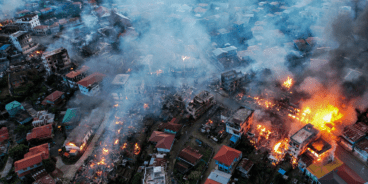
Atrocity Alert No. 62: Central African Republic, Myanmar and South Sudan
Atrocity Alert is a weekly publication by the Global Centre for the Responsibility to Protect highlighting situations where populations are at risk of, or are enduring, mass atrocity crimes.
Central African Republic
Despite a peace accord between the government and thirteen armed groups that was signed on 19 June, the Central African Republic (CAR) continues to experience intense violence. On 30 June the UN Refugee Agency stated that it was “extremely worried” about a resurgence of fighting in Bria, Zemio and Kaga-Bandoro. The violence has featured armed clashes between various factions of the ex-Séléka – notably the Front Populaire pour la Renaissance de la Centrafrique (FPRC), Union pour la Paix en Centrafrique (UPC) and Mouvement Patriotique pour la Centrafrique (MPC) – and local anti-balaka militias.
In Bria alleged anti-balaka militia members clashed with the FPRC from 20-23 June, resulting in at least 136 people being killed. An unknown number of residents fled, including almost the entire population of camp Ndourou IV, which had hosted nearly 2,400 internally displaced persons. Between 27-30 June another 22 people were killed in Zemio, close to the border of the Democratic Republic of Congo when armed Fulani herders, perceived as being affiliated with the UPC, clashed with the local anti-balaka militia. Additional fighting took place in Zemio on 4 July. On 1 July the MPC carried out attacks in Kaga-Bandoro against UN sites, threatening peacekeepers and humanitarian staff.
Despite political progress over the last year, the government remains unable to uphold its protective responsibilities. Peacekeepers from the UN stabilization mission in CAR must deploy in adequate numbers to all areas where civilians face attacks by armed groups and respond robustly to emerging security threats.
Myanmar
On 29 June the Foreign Ministry of Myanmar confirmed that it has ordered its embassies not to grant entry visas to members of a UN Human Rights Council-mandated fact-finding mission, denying the investigators access to the country. The independent, international fact-finding mission was mandated by the Council on 24 March in response to allegations of widespread abuses and possible mass atrocity crimes committed by the security forces in Myanmar, particularly during a four-month “clearance operation” in Rakhine state. During the operation, which began on 10 October 2016, the security forces perpetrated widespread and systematic attacks against the minority Rohingya community, including extrajudicial executions, rape and torture, possibly amounting to crimes against humanity. Internal investigations into the “clearance operation” have been discredited for lacking impartiality.
The denial of access to members of the UN fact-finding mission demonstrates a disturbing unwillingness on behalf of Myanmar’s government to engage with the international community regarding the persecution of the Rohingya. The democratic government, led by Nobel Peace Prize winner Aung San Suu Kyi, has continued the previous government’s discriminatory polices and appears unwilling to end impunity for systematic violations and abuses of human rights committed against Rohingya civilians in Rakhine.
The Myanmar government should urgently review its decision to deny entry to the UN fact-finding mission and should also allow for the establishment of an OHCHR office in the country. Governments with significant political and economic ties to Myanmar should review their relationship with a state that continues to systematically deny basic human rights to people because of their ethnic and religious identity.
South Sudan
Sunday, 9 July, marks the sixth anniversary of South Sudan’s independence. Since its founding in 2011, the world’s youngest country has been marred by sporadic inter-communal violence, endemic corruption and a devastating 2013-2015 civil war between rival factions of the army and ruling party. The civil war broke out in December 2013 when President Salva Kiir accused former Vice President Riek Machar of planning a coup, resulting in a split in the Army, widespread fighting and the killing of civilians by forces loyal to either President Kiir or Machar. Despite the signing of a peace agreement in August 2015 that formally ended the war, the country still faces multiple political, security and humanitarian crises.
Over the past year civilians in South Sudan have suffered targeted killings on the basis of ethnicity, a man-made famine, and widespread sexual and gender-based violence. More than 1.9 million people are internally displaced and another 1.9 million have sought refuge in neighboring countries. The 2015 Peace Agreement has never been fully implemented, root causes of the civil war have not been addressed, and there has been no accountability for mass atrocities that were committed.
After a twenty-year war for independence and three years of civil war, it is time for President Kiir and all the country’s leaders to uphold their responsibility to protect all of South Sudan’s people, regardless of their ethnicity or political affiliation. The regional Intergovernmental Authority on Development, African Union and United Nations should increase efforts to bring an end to the suffering of the people of South Sudan by imposing an arms embargo, expanding targeted sanctions against those undermining the Peace Agreement, and setting clear deadlines for the establishment of the Hybrid Court in order to hold perpetrators of atrocities accountable.
Related Publications


